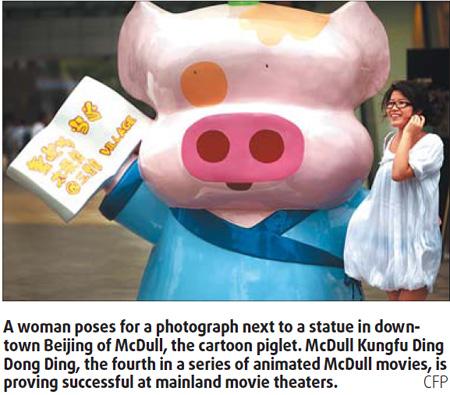
McDull, a cartoon piglet, created a fun summer for movie fans and also made a pile of money in a down economy.
The hit movie McDull Kungfu Ding Dong Ding is the fourth in a series of animated films featuring the piglet McDull.
In the new movie, the native of Hong Kong travels to the mainland to attend a kungfu school. His single mother accompanies him to start a small catering business.
Since the movie was released on July 24, it reportedly has earned more than 70 million yuan at the box office.
The movie reportedly raked in 10 million yuan on just the first day and more than 33 million in its first five days of release.
Industry insiders are predicting the movie will out-gross Pleasant Goat and Big Big Wolf, which earned 90 million yuan nationally.
On a Sunday morning in mid-August at Wanda Cinema on the northern outskirts of Beijing, tickets to see McDull were sold out more than an hour before the start of the film.
Disappointed crowds stood outside the cinema, and one child was crying because his mother could not buy tickets to see his favorite piglet.
The movie was still attracting large audiences at the theater a month after its release. About half were parents and children. The rest were white-collar female workers and young couples.
A worker at Wanda Cinema surnamed Su said attendance exceeded 80 percent on weekdays and weekends, leading the theater to increase the number of showings.
"After watched Kungfu Panda, an absolutely Hollywood-style movie, I was wondering whether Chinese movie-makers are able to use such Chinese cultural elements," said Zhu Tong, a movie patron.
"I'm very pleased to see this McDull episode," Zhu said.
Created in 1988 by Hong Kong couple Alice Mak and Brian Tse, the cartoon character McDull is a child in an ordinary Hong Kong family. He is slow, poor and naive.
Mainland success
Co-produced by Shanghai Media Group (SMG) and three other companies with an investment of HK$15 million, McDull Kungfu Ding Dong Ding is the first in the McDull series of films to be shown on the Chinese mainland.
"The great popularity of McDull Kungfu is very much linked to the current economic situation, as it reflects many people's real lives in Hong Kong and the mainland," said Lawrence Chen, a senior strategist at Interbrand, an international consulting firm.
"Many in the audience, like McDull, think they are not very smart or wealthy. But McDull is very optimistic, very easy to satisfy with a chicken meal or some other tiny things, and he also keeps pursuing his dream no matter how hard it is," Chen said.
Chen also cited the timing of the movie's release in a down economy.
"During the global economic meltdown, there is lots of uncertainty in people's hearts, and they very much need comfort," Chen said, "McDull is coming at the right time."
Mak, the character's co-creator, said the latest McDull movie is unlike earlier films that featured stories about the mother's struggles in Hong Kong.
"The two move to the Chinese mainland looking for fortune and pursuing their dreams, as many Hong Kong people are currently doing," Mak said.
Wang Lei, the film's producer, told Shanghai Daily that the movies are part of a plan to make McDull a competitive domestic cartoon brand.
Currently, 52 Chinese cinemas are featuring lotteries that will award the winners a free trip to Maldives, McDull's dream destination.
McDull-themed credit cards are available from Shanghai Pudong Development Bank.
Producers will develop books and DVDs based on the films, as well as educational materials for children, Wang said.
Wang added that a McDull-themed concert, a popular annual event in Hong Kong, will be staged in Shanghai around Christmas. A children's play and musical also are in the works.
While unlicensed McDull products can be found at some small stores or through e-commerce platforms, Wang said a McDull flagship store is expected to open in Shanghai later this year.
The flagship store will sell piglet-related items and serve as a club for fans.
Chen of Interbrand said McDull has a long way to go to match the international brand status of Japan's Hello Kitty or the United States' Mickey Mouse.
The goal is to close the gap between popular icon and commercial brand, Chen said.
"As a brand, it needs very clear and constant values that all its products will persist in and deliver," Chen said.
"McDull should make sure of its core values before it finally become a brand with various products," he said.





